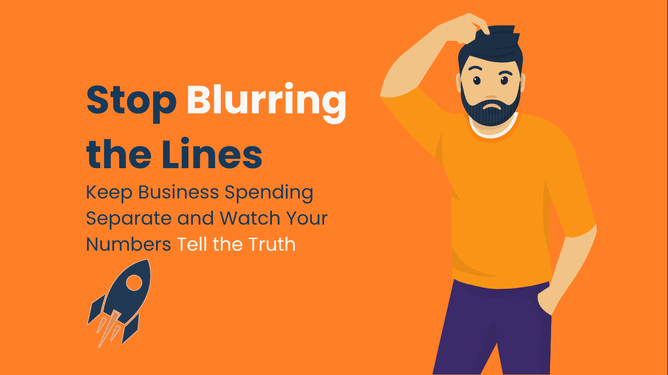Running a business already takes grit. Mixing company costs with groceries and Netflix takes that grit and turns it into quicksand. The mess feels small at first but it drags you under when you least expect it. It creates increased costs, confusion, risk and unnecessary complexity.
“Everything lands on one credit card and I’ll sort it out later.”
Sound familiar? It’s one of the most common accounting shortcut we see and it always ends the same:
Sleepless nights before tax time as you trawl old statements.
Inflated tax or GST because private spending was coded as business (and costly mistakes to repay money already spent)
An IRD review that feels more like a forensic audit than a chat.
It might save you five minutes now, but it’ll cost you five hours — and possibly five thousand — later.
Separate spending is more than tidy bookkeeping. It builds a clear financial story that helps you lead with facts.
Example: Jake the Landscaper
Jake runs a growing landscaping business with three staff, two work vans, and a car he drives personally. Like many small business owners, he uses both his business and personal cards depending on what’s in his wallet at the time. A tank of petrol here, a few materials there; it all gets paid for one way or another.
At first, it seemed harmless. But over time, Jake’s business reports started showing razor-thin margins. His fuel costs looked massive, and his personal spending on tools and work supplies (paid from the family account) never showed up in the P&L. He started questioning staff productivity and even considered letting one of his team go.
When we caught up and talked with Jake, we uncovered completely different story.
Personal petrol for the family car had been charged to the business every few weeks (about $150 to $200 per fortnight) and was being claimed as a deductible expense, including GST.
Business fuel for the vans was often paid from Jake’s personal card, meaning those genuine business costs weren’t being claimed.
Tools and equipment paid from the personal account were also missed. This resulted in him not claiming depreciation or claiming the correct expenses.
The result?
Jake’s profit was understated, GST was overclaimed, and his shareholder current account was inaccurate. The business looked like it was barely breaking even when it was actually healthy.
Once we untangled the personal from the business:
The true net profit increased by over $30,000.
GST adjustments were made voluntarily to avoid penalties later.
The shareholder current account was corrected to reflect actual drawings and reimbursements.
Jake finally felt confident in his numbers and held onto his team who were doing a solid job all along.
When business and personal spending blur, it’s not just a tax risk. It distorts how you see your business. Clean data creates confidence and better decisions.
Recommendations
1. Open a dedicated bank account for every trading entity.
2. Use one card only for business spending. Don’t link it to Uber Eats or Netflix. That’s how the lines start to blur.
3. Automate transfers Pay yourself a regular owner draw into your personal account rather than dipping into business funds.
4. Set clear rules for you (and your team) Personal spending on the company card is a not allowed
5. Review monthly Reconcile the shareholder current account and clear any balance before it grows teeth.
Common objections we hear — and why they don’t stack up:
“A second account costs fees.” The savings in compliance time will dwarf the charges.
“Carrying two cards is annoying.” So is hunting for receipts 8 months later. Scan your cards into Apple Pay or Google Wallet and forget the plastic.
“I am a sole trader. It does not matter.” It matters even more. Your business profit flows straight to your personal tax. Clean data means you pay the right amount and no more.
In Summary
Keep business and private spending apart and you gain:
Clean books that make decision making fast.
Accurate tax filings that avoid penalties.
A shareholder current account that stays in credit.
Peace of mind when IRD calls because every line is easy to trace.
Contact Us
Contact us today to discuss on 07 827 9130 or email us. Our office is in Cambridge, NZ, but distance is no problem. We have many international and national clients.
This material has been prepared for informational purposes only, and is not intended to provide, and should not be relied on for, tax, legal or accounting advice. You should consult your own tax, legal and accounting advisors before engaging in any transaction.


